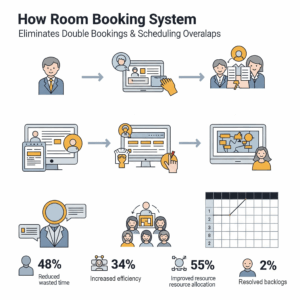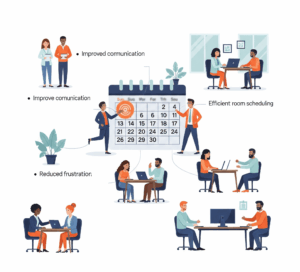
News & Updates

How can room booking systems reduce workplace conflicts?
Efficient management of shared meeting spaces has become a critical factor for organisational harmony in 2025. Modern workplaces, especially those embracing hybrid models, demand seamless scheduling to prevent misunderstandings, resource bottlenecks, and the friction that often arises from double bookings or opaque reservation processes.
Room booking systems are now central to this transformation. These digital solutions automate the allocation of meeting rooms and associated resources, providing real-time visibility and integration with everyday tools such as Slack and Teams. By eliminating manual processes and equipping employees with transparent access, organisations foster a fairer, more collaborative environment directly reducing workplace conflicts and promoting productivity.
Eliminating Double Bookings and Scheduling Overlaps
One of the most common sources of workplace conflict is the clash over shared spaces. Double bookings, last-minute cancellations, and unclear reservations can quickly escalate into frustration and lost time. Room booking systems address these challenges head-on by providing an automated, centralised platform that manages all reservations in real time.
- Instant visibility: Employees can view live availability of rooms, reducing the risk of accidental overlap.
- Automated conflict resolution: The system prevents double bookings by locking in reservations and alerting users to potential clashes before they occur.
- Comprehensive resource management: Beyond just rooms, integrated booking platforms allow users to reserve vital resources such as teleconferencing equipment or catering, ensuring all needs are met without manual coordination.
Enhancing Transparency and Fair Access
Perceptions of favouritism or lack of clarity in shared space allocation can undermine workplace morale. Room booking systems introduce a layer of transparency that is essential for equitable access. Every reservation is logged and visible, ensuring that no single team or individual monopolises resources.
Integration with communication platforms like Slack and Teams further streamlines the process. Employees can reserve rooms and associated resources within their usual workflows, reducing administrative overhead and ensuring all stakeholders are informed through automated notifications and updates.
This transparency offers several benefits:
- Clear audit trails: Every booking is traceable, reducing the risk of
- Equitable scheduling: Systems can be configured to ensure fair usage quotas, particularly valuable during peak demand days.
- Real-time updates: Cancellations and changes are reflected instantly, preventing confusion and enabling swift reallocation of spaces.
By making the process visible and consistent, room booking systems build trust among employees, creating a culture of fairness and collaboration.
Supporting Hybrid Work and Peak Demand Management
With hybrid work models now standard across many sectors, demand for meeting spaces can fluctuate significantly throughout the week. Legacy manual booking methods often fail to keep pace, resulting in overcrowding or underutilised rooms, both of which spark workplace friction.
Modern room booking solutions adapt to these changing patterns. Features such as RSVP tracking and automated capacity management ensure that resources are allocated efficiently, even as teams move between remote and in-office work. Real-time analytics help facilities managers optimise room layouts and anticipate peak demand, preventing bottlenecks and frustration.
Key advantages:
- Dynamic allocation: Systems automatically adjust to fluctuations in headcount and meeting needs.
- Peak day management: Automated tools prioritise access for larger or recurring meetings, ensuring critical sessions are not disrupted.
- Space optimisation: Data-driven insights enable organisations to redesign or repurpose underused areas for maximum utility.
By aligning space management with modern workplace realities, room booking systems create a harmonious environment where conflicts are proactively addressed rather than reactively managed.
- Encourage all employees to use the booking system for every reservation, no matter how informal.
- Set up automated notifications to remind users of upcoming bookings and
- Regularly review analytics to identify and address recurring scheduling conflicts or underutilisation.
Creating a Conflict-Free, Collaborative Workplace
In today’s fast-evolving business environment, seamless management of shared resources is vital for operational efficiency and employee satisfaction. Room booking systems, as
demonstrated by leading organisations and enabled by trusted partners like ATT Group, play a pivotal role in reducing workplace conflicts. By automating scheduling, enhancing transparency, and providing actionable insights, these platforms support harmonious collaboration and drive higher productivity across all sectors.
To discover how ATT Group’s enterprise IT solutions can help your organisation create a more harmonious, efficient workplace, contact our team at infosoft- sales@attsystemsgroup.com for a consultation today.
Frequently Asked Questions
What is a room booking system?
A room booking system is a digital platform that automates the scheduling and management of shared meeting spaces and associated resources. It provides real-time visibility, integrates with tools like Slack and Teams, and eliminates manual processes to streamline the reservation process.
How do room booking systems prevent double bookings?
Room booking systems prevent double bookings by offering real-time visibility of room availability, automated conflict detection that prevents overlapping reservations, and instant notifications to alert users of potential clashes before they occur.
How does transparency in room booking reduce workplace conflicts?
Transparency in room booking ensures that every reservation is logged and visible to all employees. This reduces misunderstandings and eliminates perceptions of favouritism. Features like audit trails, equitable scheduling, and real-time updates promote fairness and trust within the workplace.
How do room booking systems support hybrid work environments?
Room booking systems adapt to the dynamic needs of hybrid workplaces by providing RSVP tracking and automated capacity management to accommodate fluctuating headcounts, offering real-time analytics for facilities management to optimise space usage, and automatically prioritising larger or recurring meetings during peak demand days.
How can organisations ensure effective use of room booking systems?
To maximise the benefits of a room booking system, organisations should encourage employees to use the system for all reservations, including informal ones; set up automated notifications to remind users of upcoming bookings or cancellations; and regularly review usage analytics to identify and address recurring conflicts or underutilised resources.
What are the advantages of using ATT’s room booking solutions?
ATT offers industry-leading room booking solutions with benefits such as customisable, scalable solutions tailored to client needs; integration with enterprise systems and regulatory compliance; and 24/7 technical support and ISO-certified operations.
How does a room booking system contribute to a conflict-free workplace?
Room booking systems automate scheduling, enhance transparency, and provide actionable insights, which helps create a harmonious workplace. They align resource management with modern workplace demands, reducing the potential for misunderstandings and fostering collaboration.
How can I get started with ATT’s room booking solutions?
To explore how ATT’s enterprise IT solutions can help your organisation reduce workplace conflicts and improve efficiency, contact ATT via their website www.attsystemsgroup.com or email infosoft-sales@attsystemsgroup.com.
Send us a message
Contact Information
Address:
35 Ubi Crescent, ATT Building, Singapore, 408585
Phone:
Email:
Website:
www.attsystemsgroup.com






